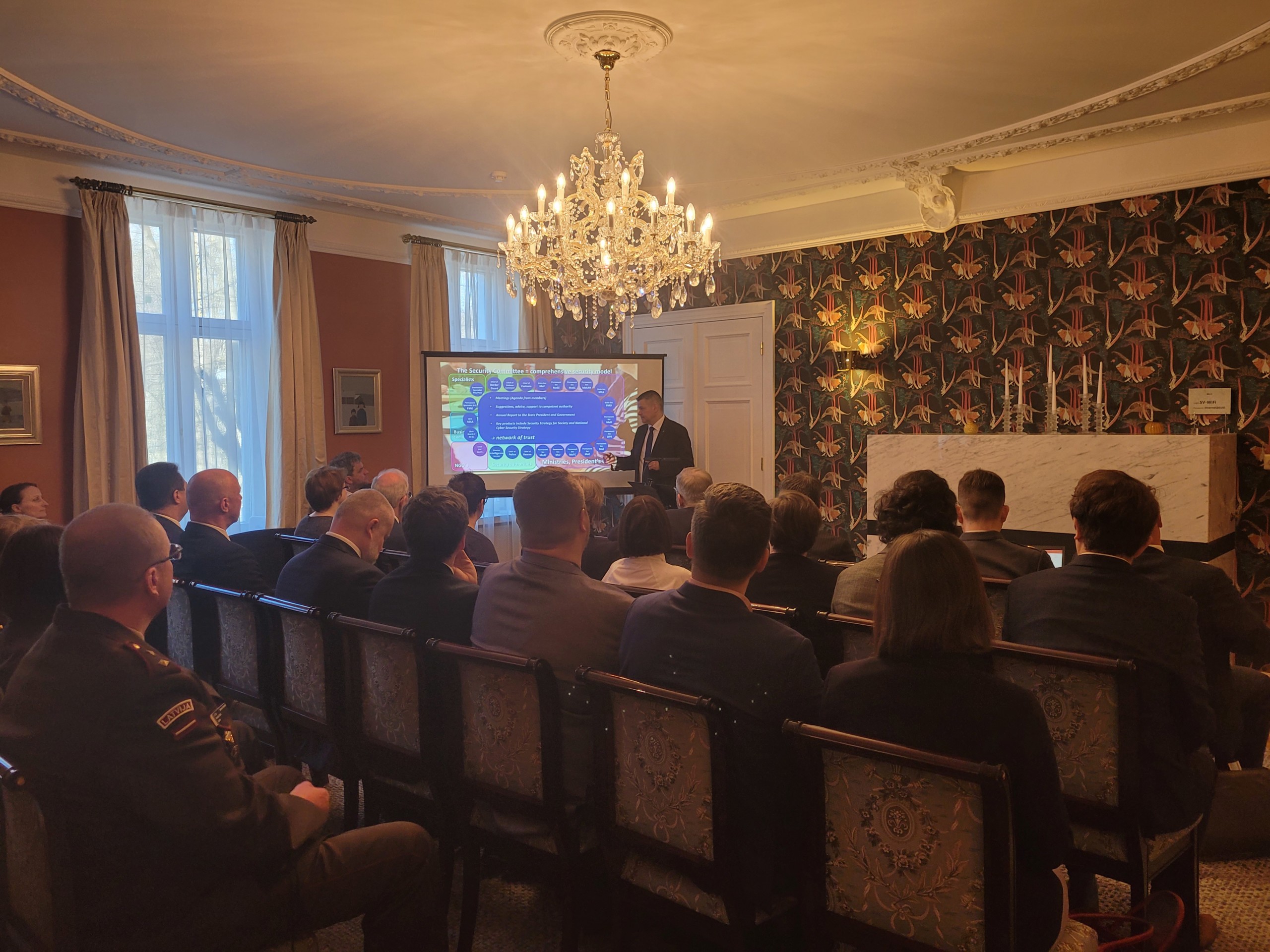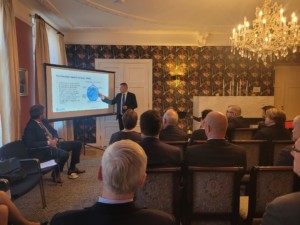
Latvian Seminar on Comprehensive Security and Resilience
On April 19th, the Finnish Embassy in Riga invited Latvian policymakers, civil servants and diplomats to hear about Finland’s National Resilience and the Concept of Comprehensive Security. Secretary-General Mr. Petri Toivonen from the Secretariat of the Security Committee held a keynote speech where he highlighted close cooperation on preparedness issues. In addition, the audience heard presentations from Mr. Axel Hagelstam (National Emergency Supply Agency), Mr. Christian Perheentupa (the Secretariat of the Security Committee), Mr. Niko Ristikankare (Wega), Mr. Olli Rusanen (Finnish Ministry of Defence) and Colonel Marko Kivelä (Finnish Defence Forces). The seminar was held at the Finnish Embassy and included opening remarks from H.E. Ambassador Mrs. Anne Saloranta.
Finnish knowledge and expertise on preparedness issues has been highly valued during the last years. Finland has a lot of experience in the whole-of-society approach in preparedness, where all sectors of society are included. This also includes the private sector, which has increasingly important role in preparedness, as well as non-governmental organizations (NGO’s). The Finnish delegation, consisting of representatives from both public and private sector, had a pleasure to give a comprehensive outlook on the Finnish preparedness and cooperation model in Riga, Latvia. Sharing the best practices also helps to build a more resilient Alliance – Important for Finland as a recent NATO member.
Finnish Comprehensive Security lays out the principles of preparedness cooperation
During his keynote speech, Mr. Petri Toivonen from the Secretariat of the Security Committee underlined a need for even closer cooperation between different societal sectors. The Finnish preparedness model is based on Comprehensive Security, where all functions vital for society are safeguarded in cooperation with authorities, private sector, NGO’s and citizens. In this, everyone has a role: The Government is in charge of the overall picture and coordination of efforts in safeguarding vital functions, Authorities, Municipalities and other Public organs cooperate together in order to ensure continuity of services. NGO’s provide services, coordinate the participation of volunteers in the activities supporting authorities. The Private sector has an increasingly important role in the preparedness process, as businesses operate the society’s critical infrastructure. According to Mr. Toivonen, the focus of the Security Committee is in bringing all these actors together to evaluate the level of societal preparedness and to think where there might be room for improvement.
citizens. In this, everyone has a role: The Government is in charge of the overall picture and coordination of efforts in safeguarding vital functions, Authorities, Municipalities and other Public organs cooperate together in order to ensure continuity of services. NGO’s provide services, coordinate the participation of volunteers in the activities supporting authorities. The Private sector has an increasingly important role in the preparedness process, as businesses operate the society’s critical infrastructure. According to Mr. Toivonen, the focus of the Security Committee is in bringing all these actors together to evaluate the level of societal preparedness and to think where there might be room for improvement.
Protecting critical infrastructure, which often is privately owned, has recently been high on political agenda. In Finland, the cooperation between private and public sector has a long history, as Mr. Axel Hagelstam from the National Emergency Supply Agency (NESA) brought out in his presentation. Especially helpful are pools operating in connection to NESA, as they bring in different actors from across the sectors. This has been an advantage in sharing information, constructing common situational awareness and organizing exercises. Another great example of connecting people are National and Regional Defence Courses, highlighted by Mr. Christian Perheentupa. The key idea behind these courses is to give an overview of Finnish foreign security and defence policy and preparedness in different sectors of the society to key personnel in leading positions (both in regional and national level). Defence courses are especially good in familiarizing the participants with the responsibilities of the different sectors of society.
These elements were not only highlighted by public sector representatives, also by Mr. Niko Ristikankare, the Chief Executive Officer of Wega Corporation (working with the energy sector). According to Mr. Ristikankare, an active discussion with different authorities, information exchange and high quality courses, such as National and Regional Defence Courses, are vital in bringing people together. The U-turn in energy supply in 2022 was an excellent example of a situation where close cooperation was needed not only in national but international level as well.
Finnish Defence and Comprehensive Security
In addition to Comprehensive Security, the audience was given an introduction to National Defence in Finland. Present was Mr. Olli Rusanen, Senior Staff Officer from the Ministry of Defence and Colonel Marko Kivelä, deputy commander of Pori Brigade. Mr. Rusanen highlighted that after the Finnish Nato alignment, Finland’s defence continues to base on Conscript Service, a trained reserve, the defence of the entire country and a high level of will to defend the Finnish soil. Especially the Finnish reserve training system was met with interest by the audience. High level of will to defend is also seen in the participation level to voluntary defence training, organized mainly by National Defence Training Association in close collaboration with the Defence Forces and the Finnish Ministry of Defence.
Colonel Kivelä from the Pori Brigade also underlined the high will to defend Finland and capable and broad reserve system as the foundation of the Finnish Defence System. The level of will to defend Finland remains very high, in 2022 over 80%. One of the key reasons is that defence is very close to society and families – almost everyone knows someone who has served in the military. Successful and good conscription system is the key element in all this. Quality of training and overall experiences about the service need to be at the heart of the Conscript System as well as professionalism and safety.
After the presentations, the audience had a possibility to ask questions from the delegation. Discussions revolved around Finnish conscript service, preparedness against hybrid threats, civil shelter arrangements and the involvement of non-governmental organizations in to the work of the Security Committee, among other topics.
We want to express our gratitude to H.E. Ambassador Mrs. Saloranta and to whole staff at the Finnish Embassy in Riga, all Finnish participants and to all those who took part in the seminar and discussions afterwards.
